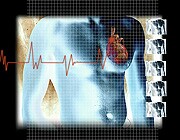
WEDNESDAY, Nov. 12, 2014 (HealthDay News) — Mutations that affect a single gene may significantly reduce the risk of heart disease, a new study suggests.
People have two copies of most genes. One copy is usually inherited from each parent. Researchers found that people with rare mutations that switch off a single copy of a gene called NPC1L1 are protected against high levels of “bad” LDL cholesterol and narrowing of the heart’s arteries.
People with one inactive copy of the gene have a 50 percent reduced risk of heart attack, according to the study. The research was published Nov. 12 in the New England Journal of Medicine.
The researchers also noted that NPC1L1 is targeted by the cholesterol-lowering drug ezetimibe (Zetia).
“This analysis demonstrates that human genetics can guide us in terms of thinking about appropriate genes to target for clinical therapy,” study first author Dr. Nathan Stitziel, a cardiologist at Washington University School of Medicine, said in a university news release.
“When people have one copy of a gene not working, it’s a little like taking a drug their entire lives that is inhibiting this gene,” he added.
Stitziel and colleagues analyzed data from about 113,000 people and found that only 82 had mutations that switched off one copy of NPC1L1. No one had two inactive copies of the gene. The researchers estimated that about 1 in 650 people have an inactive version of NPC1L1.
“Protective mutations like the one we’ve just identified for heart disease are a treasure trove for understanding human biology,” study senior author Dr. Sekar Kathiresan, director of preventive cardiology at Massachusetts General Hospital, said in the news release. “They can teach us about the underlying causes of disease and point to important drug targets.”
More information
The U.S. Centers for Disease Control and Prevention outlines how to prevent heart disease.
Copyright © 2026 HealthDay. All rights reserved.

